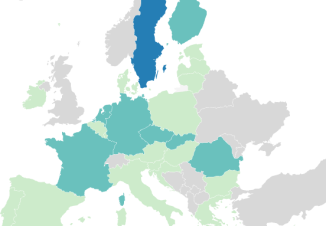
The European Union has agreed a new Work-Life Balance Directive, which must be implemented by member states by 2 August 2022. The Directive provides an EU-wide right to ten days’ paternity leave, paid at least at the level of sick pay, from day one. It reforms the existing EU-wide right to parental leave, so that two out of the four months of parental leave must be paid and will not be transferable from one parent to the other. The Directive also introduces a new right to carer’s leave, which will give employees the right to up to five days’ leave each year to care for someone at home with a serious medical condition in need of care or support. Member states can decide if this is paid. It also requires EU member states to extend the right to request flexible working arrangements to working carers and parents of young children (up to eight years old). A six-month service qualification can be imposed by member states.
Countries across Europe are already improving their paternity rights ahead of the Directive’s introduction. In 2019, Austria introduced ‘daddy month’ (one month’s leave following the birth of a child), Italy increased its mandatory paid paternity leave from four to five days and the Netherlands increased its paid paternity leave entitlement from two to five days. With effect from 1 July 2020, the Netherlands will also provide an additional five weeks’ paternity leave to be taken within the first six months of the child’s birth, paid at 70% of normal salary.
Ireland is increasing its unpaid parental leave entitlement to 26 weeks for both parents with effect from September 2020. It has also introduced a new entitlement to two week’s ‘parent’s benefit’ paid by the state.
Spain is equalising its maternity and paternity leave rights. When fully implemented, the law will give all parents in Spain up to 16 week’s leave each, with the first six weeks’ leave being compulsory for both parents.
In Poland, parents of disabled children obtained the right to request flexible working, and maternity and parental leave became available to employees who are ‘other members of immediate family’ on the same basis as parents. From 1 January 2020, Slovakia increased its holiday entitlement for employees under 33 who are taking care of a child on a permanent basis (to five weeks).
In the UK, the new government is introducing parental bereavement leave and has said it will take forward plans to allow parents to take extended leave for neonatal care (following a consultation starting in July 2019), look at ways to make it easier for fathers to take paternity leave, and introduce a week’s leave for carers.
Employers in federally regulated sectors in Canada (such as banks, transportation and communications) have had to comply with a new Labour Code from September 2019. This provides for breastfeeding breaks, scraps service requirements for maternity and parental leave, introduces leave for victims of family violence, paid bereavement leave, personal leave (up to five days each year, three of which will be paid, for illness, family responsibilities etc) and up to five days’ leave each calendar year for an employee who is an Aboriginal person to engage in traditional Aboriginal practices including hunting, fishing and harvesting.
In the US, California has strengthened its requirements for accommodating breastfeeding mothers, with new rules about lactation rooms and breaks to pump milk. In LATAM, Peru has introduced a right for employees to apply for paid leave to assist dependents with disabilities.
Family rights are increasing in parts of the Middle East, Africa and APAC too:
Any unused period of childcare leave may instead be used as a period of reduced hours. Currently, employees are allowed 90 days a year of family-care leave but must take it in blocks of 30 days at a time, so can only use it up to three separate times a year. From 1 January 2020, employees became able to use up to ten days of this leave as individual days of leave. A new right to reduced working hours for family care is being phased in gradually.
Some countries have strengthened rights to flexible working for all employees. At the EU level, the focus is still on the needs of parents and carers (so the Work-Life Balance Directive, for example, provides the right to request flexible working arrangements only to parents and carers, not to all employees generally). However, some EU Member States are going further. Finland is leading the way here, with radical laws on flexible working coming into effect from 1 January 2020. Amongst other things, Finland has introduced a new type of flexible working arrangement (which must be agreed between employers and employees) that allows employees complete flexibility to choose both the time and the place of at least half of their working hours.
In Germany, a statutory entitlement to part-time work for a period of one to five years came into force in January 2019, available to all employees who meet qualifying requirements without a need to give reasons. However, this has only been used to a very limited extent to date as employers tend to offer their own more flexible solutions or collectively agreed flexibility programmes. Spain has expanded its right to request flexible working arrangements to allow employees to make requests for home working. The new UK government has said it will encourage flexible working arrangements and consult about making flexible working arrangements the default unless employers have a good reason otherwise.
A number of countries outside Europe have strengthened their flexible working laws. As part of its wide-ranging reforms to employment law, the Dubai International Financial Centre has specifically recognised the existence of part-time employment, and provided for part-time employees to have leave entitlements on a pro-rata basis. The new laws in Canada for federally regulated employees give the right to request flexible working after six months’ employment. South Korea has introduced a new right to reduced working hours for family care, illness or injury, retirement preparations (at age 55 +) or academic study. Currently, the law only entitles employees to have reduced working hours during the early and late stages of pregnancy, or for childcare purposes.


